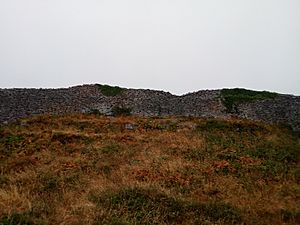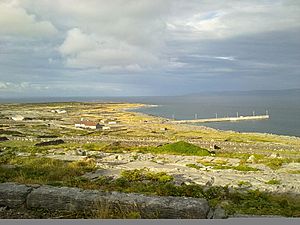Dún Fearbhaí facts for kids
Quick facts for kids Dún Fearbhaí |
|
|---|---|
| Doonfarvagh, Doonfarbagh, Dún Mur, Dún an Mhothair, Dun Moher, Fearboy’s Fort, The Small Fort | |

Stone walls of Dún Fearbhaí
|
|
| Type | stone ringfort |
| Location | Carrownlisheen, Inishmaan, County Galway, Ireland |
| Area | 900 m2 (0.22 acres) |
| Elevation | 57 m (187 ft) |
| Height | 5 m (16 ft) |
| Built | c. AD 1–1000? |
| Architectural style(s) | Gaelic Ireland |
| Owner | State |
| Official name: Doonfarvagh | |
| Reference no. | 42 |
| Lua error in Module:Location_map at line 420: attempt to index field 'wikibase' (a nil value). | |
Dún Fearbhaí is an ancient stone fort on Inishmaan, an island in Ireland. It's also known as a ringfort or cashel. This special place is protected as a National Monument.
Contents
Where is Dún Fearbhaí?
Dún Fearbhaí sits on the eastern side of Inishmaan island. From the fort, you can look out over Galway Bay. It's a great spot with amazing views!
A Look at Its History
Historians believe this fort was built a very long time ago. It might be from the 1st millennium AD, possibly around the 9th century. Its unique square shape with rounded corners makes it special.
This shape suggests it might be newer than other forts on the Aran Islands. For example, it could be from the same time as Dún Formna on Inisheer.
What Does the Name Mean?
The name Dún Fearbhaí comes from the local area, An Fhearbach. This means "abounding in cattle," suggesting the area was rich in livestock.
Another name for the fort was Dún Mur. This name is similar to the famous Cliffs of Moher. The cliffs are named after an old fort called Moher.
Exploring Dún Fearbhaí
Dún Fearbhaí is a stone ringfort (cashel). It has a unique shape, like a square with rounded corners. The fort is built on a steep slope.
Walls and Structure
The fort has two main walls and one terrace. There are also four sets of stairs inside the fort. These stairs let people climb to the top of the walls.
The walls are very strong. They can be up to 4 m (13 ft) high and 3 m (9.8 ft) thick. Inside, the fort measures about 27 m (89 ft) by 23 m (75 ft).
The Entrance
There is only one way into the fort. The entrance is on the eastern side and is 2 m (6 ft 7 in) wide.
Why Were the Walls Built This Way?
Building very tall, thick walls would have taken a lot of effort. So, the builders used a clever trick: terracing the walls. This meant they used less material.
The terraced walls also had steps. This allowed people to easily reach the top. From there, they could see far around them. This gave them a great view of anyone approaching. It also gave them a strategic advantage against attackers. The tall, strong walls were a great defense. They also showed how important the fort was!


